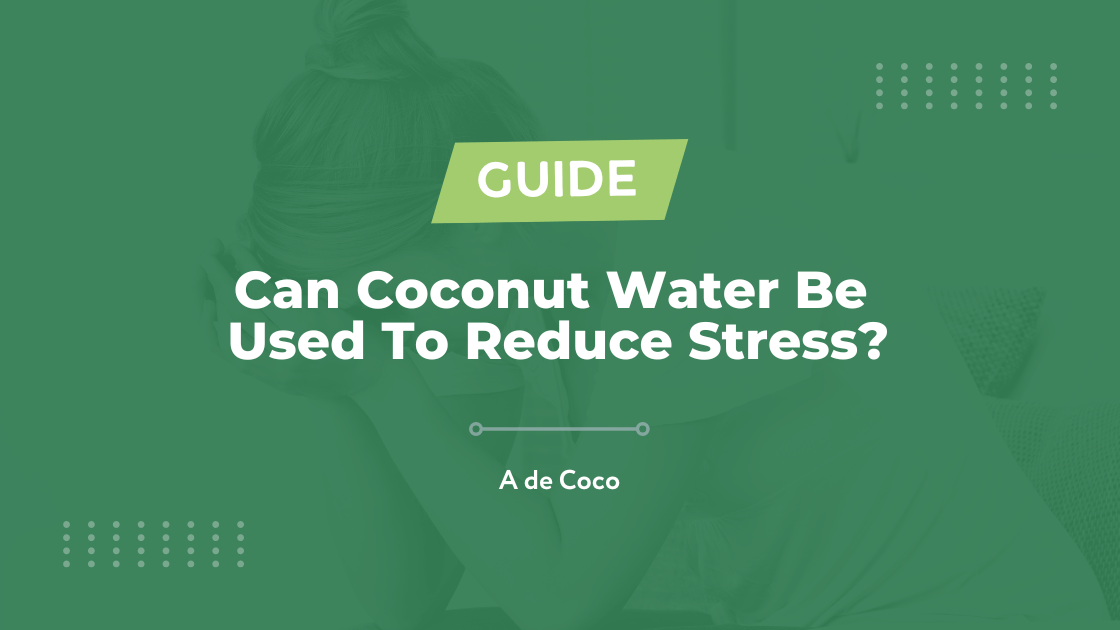Yes, coconut water can be used to reduce stress.
This is primarily due to its high content of potassium and magnesium, which are known for their stress-relieving properties.
Potassium plays a significant role in regulating blood pressure, thus mitigating the physical symptoms of stress.
Similarly, magnesium helps to regulate the nervous system, preventing anxiety and promoting a sense of calm.
Additionally, drinking coconut water helps with hydration, which is often compromised during stressful periods.
Thus, regular consumption of coconut water can contribute considerably to stress management strategies.
- Coconut water’s composition, including potassium, aids in stress reduction.
- Magnesium present in coconut water also helps alleviate stress.
- Improved hydration, correlates with reduced stress.
- Coconut water can assist in alleviating anxiety and promote feelings of calm.
- Frequent consumption of coconut water results in several health benefits beyond stress reduction.
The health benefits of coconut water extend far beyond just stress reduction.
In the following sections, we’ll also be talking about the various other advantages of incorporating this tropical drink into your daily diet.
This exploration includes a closer look at how coconut water aids digestion, boosts heart health, and contributes to skin hydration.
Contents
What is Coconut Water’s Composition?
You’ve probably heard about the touted health benefits of coconut water, right? But have you ever stopped mid-sip to wonder, exactly, what is in this tropical beverage?
Well, let’s dive in and discover what coconut water is made of!
First off, coconut water is essentially the clear liquid found inside young, green coconuts. It is not to be confused with coconut milk, which is a richer, creamier concoction produced from the coconut’s flesh.
Coconut water, you see, has a rather unique composition. Despite its minimal caloric content— fewer than 50 calories per cup, it offers a wealth of essential nutrients.
This incredible beverage is around 95% water. But even then, the remaining 5% packs a real punch in terms of nutrition.
The initial presentation of coconut water’s composition might be surprising. Below are the major components of coconut water, that evoke a sense of intrigue:
- It contains several essential electrolytes, including potassium, sodium, magnesium, and calcium. These minerals are critical for numerous bodily functions, from maintaining proper hydration to supporting nerve and muscle function.
- It’s packed with B-complex vitamins such as thiamin, riboflavin, niacin, folic acid, and pyridoxine. These vitamins play pivotal roles in energy production and cell repair.
- Coconut water contains organic compounds like cytokinins, which are known for their anti-aging, anti-cancer, and anti-thrombotic effects.
- Finally, it consists of enzymes and amino acids that support digestion and ease fatigue.
Impressively, one cup of coconut water also provides about 10% of your daily needs for vitamin C. An important antioxidant for reinforcing your body’s natural defenses.
Aside from its nutrients, coconut water is also characterized by its sweet and nutty taste. How on earth do nutrients and taste square up? It’s like a piano’s symphony, each separate note contributes to a pleasant, harmonious melody.
And as a bonus, it’s primarily cholesterol-free. Now, who could have guessed, right? It’s like nature’s sports drink, without the artificial sugars!
How Does Potassium Reduce Stress?
Let’s dive right in, shall we? Well, potassium has a role that might surprise most of us. It has an influence over the way our bodies respond to stress.
Think about how many times you’ve been told to take deep breaths when you’re stressed, right?
Your body doesn’t pull this magic trick out of nowhere. It’s a carefully calibrated reaction for which potassium is the secret ingredient.
But what does this mean? It means that without enough potassium, this stress-calming reaction might not proceed as smoothly as you’d want.
It also plays an essential role in nerve function, muscle control and blood pressure regulation.
The strong relationship between potassium and stress comes from its role in the nervous system.
It helps to conduct nerve impulses, the tiny signals that make our bodies run every day.
Now let’s touch on the list of those specific functions potassium demonstrates:
- It helps conduct nerve impulses.
- It assists in regulating blood pressure.
- It maintains fluid balance.
- And it helps muscles, like our heart, contract properly.
But even then, normal levels of potassium won’t necessarily tip the scale entirely to serenity.
There are other factors at play here, everything from individual health and lifestyle to overall dietary and exercise habits.
I can’t stress enough how important a well-rounded approach to health, including a proper diet and lifestyle, is to managing stress.
Can I say that just by guzzling potassium-rich coconut water like a parched cowboy, all your stress will vanish into thin air? No.
What I can tell you is it’s a piece of the puzzle that should not go ignored.
Something that needs careful attention as we navigate the often-stressful seas of life.
Magnesium in Stress Reduction
Let’s start by calling magnesium the unsung hero of our bodily functions. I mean, it’s involved in over 300 enzymatic reactions within our bodies!
From protein synthesis to neurological activity, magnesium is working diligently behind the scenes to keep our bodies functioning optimally.
To understand how magnesium impacts stress levels, we first need to explore a tiny part of our brain known as the hypothalamus. This tiny control center connects our nervous and endocrine systems, regulating our body’s response to stress.
But even then, the hypothalamus can only do its job with the right resources – and guess what? Magnesium is one of these important resources it needs.
Before we continue, let’s quickly summarize the importance of magnesium to our bodies:
- It’s involved in over 300 enzymatic reactions
- It aids in protein synthesis and neurological activities
- It is essential to our stress response system
One of the primary ways magnesium helps manage stress is by regulating cortisol levels. This is our primary stress hormone that sounds the alarm when we’re facing a perceived threat, but even then, excessive cortisol can wreak havoc on our bodies.
What we need is a fine balance, something that magnesium can provide.
Magnesium has a calmative effect on our bodies, helping to reduce anxiousness and promote relaxation.
Think of magnesium deficiency as trying to drive a car with no oil. Might work for a while, but eventually, the system is bound to break down.
Am I saying that reaching for coconut water, a drink high in magnesium, is like sipping on a magical, stress-busting elixir of sorts?
Well, not exactly, but the idea is intriguing, isn’t it?
While magnesium isn’t a cure-all solution, studies have shown that intake of this nutrient has been linked to lower levels of stress and anxiety.
This isn’t to say that every time you’re stressed, go open a can of coconut water. However, maintaining a healthy intake of magnesium is certainly beneficial for our stress management.
Pro Tip: Maintaining a healthy intake of magnesium can aid stress management by regulating cortisol levels, thus promoting relaxation and reducing anxiety.
In the grand scheme of things, our bodies are complex biological machines, and as with all machines, they require proper maintenance.
Magnesium is an essential part of that maintenance.
How Often Should You Drink Coconut Water?
When it comes to drinking coconut water, frequency matters just as much as quantity. We’re not talking about having a cup or two daily, but rather striking a balance for optimal wellness.
Think about it like this, is it beneficial to drink a gallon of coconut water in one sitting? Probably not. But what about sipping it consistently throughout the day? That starts to sound more like it, doesn’t it?
And this brings us to the all-important question. How often should you really be enjoying this tropical treat?
I must admit, it’s not something one can give a blanket answer to. It’s a bit like asking how many glasses of water one should drink daily. There’s no ‘one-size-fits-all’ answer, as it can depend on a variety of factors.
Much of the answer lies in your own personal lifestyle, bodily needs, and even taste preference. This is where the narrative takes an individualistic twist, just like the unique patterns on a coconut shell. Can you visualize that?
Let’s crack open this idea together and get into a few significant factors:
- The level of your physical activities
- Your system’s hydration needs
- Any health conditions you’re currently dealing with
Now, if you’re a fitness enthusiast who indulges in high-intensity workouts, you might need more replenishing. Coconut water’s natural electrolytes make it a great post-workout drink. You might gulp down a carton post-exercise and find yourself reaching for another later in the day.
Someone else living a more sedentary life, though, wouldn’t need as much. A cup or two in the day might suffice for them.
Hydration needs can also fluctuate depending on the temperature and the humidity levels of your surroundings. I mean, if you’re chilling (or, more accurately, sweating) in a tropical climate, you might need to chug more coconut water to stay hydrated, right?
Lastly, some health conditions can affect how much coconut water one should drink. For instance, those with kidney issues should limit their intake due to the high potassium content.
In the end, it’s crucial to plan out your coconut water consumption based on your body’s specific needs.
Too much of anything is never good, after all. But even then, there’s no denying the beneficial hydration and electrolyte content of coconut water makes it a pretty sweet deal.
You might be thinking, ‘That’s a lot to take into consideration for a simple beverage!’ Well, yes, it is, but it’s all in the name of personal wellbeing, wouldn’t you agree?
Correlation Between Hydration & Stress
What happens when your body is not properly hydrated? I’m sure we can all relate to that sinking feeling when we realize we’ve left our trusty water bottle at home.
Have you ever wondered, however, beyond simple physical discomfort, what effect does this lack of hydration actually have on us? Specifically, our stress levels?
Yes, you heard it right, hydration can impact stress. It may sound like a bold claim. It is one, I mean, who knew the simple act of drinking water could influence your mental turmoil?
Let’s dig a little deeper shall we? When our bodies are dehydrated, they enter a state of stress. After all, water is pivotal for our survival and bodily functions.
The body’s cells rely on water to function efficiently and when they can’t, they panic. Think of it as trying to host a huge family dinner without enough of Aunt Mabel’s famous mashed potatoes.
Chaos, right? That’s exactly how the body feels when it’s deprived of water.
Hold on, there’s more to this tale of hydration and stress. Here’s an interesting little snapshot:
- Dehydration decreases cortisol regulation, a hormone directly linked to stress response.
- It affects your body’s production of serotonin and other neurotransmitters, that are known for promoting feelings of well-being and happiness.
- It reduces the brain’s overall cognitive abilities, diminishing concentration and productivity levels, followingly leading to an increase in stress.
Now, how does this tie back to our illustrious coconut water?
It’s a rich source of vitamins, minerals and five key electrolytes: sodium, potassium, calcium, phosphorus and magnesium. These nutrients promote hydration far more effectively than water alone.
Increased hydration means less physical stress on our bodies, which translates into reduced mental stress. It’s kind of like finally finding the charging cable for your phone after it hit 1%.
I would say, it looks like we’ve stumbled upon something rather magical here. While it might not be a cure-all, coconut water is definitely a worthwhile consideration in your anti-stress arsenal.
Important: Hydration can impact stress, as dehydration puts our bodies into a state of stress, decreases cortisol regulation, affects serotonin production, and reduces cognitive abilities.
But even then, something as simple as staying hydrated, whether it’s with coconut water or not, is a sure-shot way to help keep those pesky stress levels at bay. And isn’t that something we’re all looking to achieve?
The Bottom Line
Coconut water, loaded with potassium and magnesium, contributes significantly to reducing stress levels.
Potassium aids in the reduction of stress by regulating blood pressure and balancing the nervous system.
Magnesium plays an important role in stress reduction by maintaining the health of the nervous system and regulating mood.
Staying hydrated with coconut water can help maintain a proper balance of body fluids, which is crucial for stress reduction.
Although there aren’t enough studies to assertively claim that coconut water aids in reducing anxiety, anecdotal evidence suggests a possibility.
Drinking coconut water regularly, but in moderation, can possibly contribute to overall well-being and reduced stress.
After consuming coconut water, certain physical symptoms such as elevated heart rate and excessive sweating, associated with stress, may be significantly reduced.
While the calming properties of coconut water need to be studied more, many people who consume it report a sense of increased calm and relaxation.
Good hydration levels, achieved by regular consumption of fluids like coconut water, are known to help manage and reduce stress.
- Source:
- https://www.healthline.com/nutrition/coconut-water-benefits
- https://www.healthline.com/nutrition/magnesium-supplements




